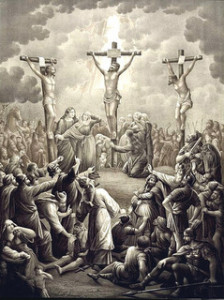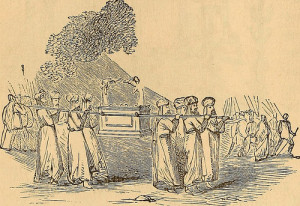There’s a fun little anecdote that most of us are probably familiar with about a frog in a pot of water. The water is warming up to a deadly boil, but at such a slow pace that the frog doesn’t have any idea, so it just floats around happily until it ultimately boils to death. But, as the story goes, if the frog had jumped into the boiling water from outside, the temperature difference would’ve been so stark that the frog would’ve promptly jumped out to safety.
Last week, I was making my way through a book that had been recommended to me and at one point the author talked briefly about Jesus dying on the cross to deal with the sin that separates us from God. This got me reflecting on another thing I’d read recently about sin and the wrath of God. Which made me reflect on yet something else I’d happened across recently that said sin cannot be in the presence of a holy God.

These things then got me thinking about the pained, desperate words of Jesus when he cried out from the cross “My God, my God, why have you forsaken me?” As the story goes where I come from, this gripping, dramatic cry reflects the pivotal moment where God had to turn his back as Jesus took on the sin of the world, leaving Jesus to experience separation from God for the first time ever. And why did he experience this separation?
Because sin cannot be in the presence of a holy God.
We hear and repeat this idea frequently within Christian communities. It’s the reason that Adam and Eve were booted from paradise. It’s the reason the priests had to go through painstaking preparations before entering the temple. And it’s ultimately why Jesus was abandoned on the cross.
Because sin cannot be in the presence of a holy God.
As I was recently thinking about all of this, I was reminded of a sermon I once heard where the preacher discussed white blood cells and red blood cells to illustrate how God responds to sin: he annihilates it.
Because sin cannot be in the presence of a holy God.
These ideas are so pervasive within Christianity that most people don’t seem to think twice about them, at least in my experience.
Yet there’s a problem with this kind of theology. It’s a problem that either we don’t feel comfortable discussing or that simply eludes us.
And it’s a problem that can be summed up with one word.
Jesus.
The one who put his fingers in the ears and touched the tongue of a deaf and mute man. The one who touched the eyes of a blind man. The one who reached out and touched a man with leprosy… and who let a sinful woman anoint and kiss his feet… and who took hold of a man with dropsy … and who invited himself into the house of the chief tax collector… and who let one of the disciples rest against his chest during the Last Supper.
Jesus.
The one who didn’t avoid adulterers, pull back from prostitutes, or turn away from tax collectors. The one who didn’t shudder around sin.
Jesus reached out to and engaged and touched others. And he allowed others to reach out to, engage, and touch him. And he did this to help heal people from whatever kind of disease that plagued them, be it physical, emotional, or spiritual – though I would venture to say that Jesus saw it all as spiritual.
He did these things to validate people and show them their inherent worth. In a sense, to say “You are deeply and truly valued in spite of what your religion has taught you.” Or in some cases “…in spite of what their religion has taught you.”
Jesus made it clear that God can most certainly be in the presence of sin. So to hold onto theology that tells us otherwise is problematic, no matter how it’s packaged.
It’s curious that these two opposing ideas have somehow managed to live next to each other in this thing we call Christianity. I guess when we’re used to living in the middle of a story, the obvious may escape us. We’re like the frog in the pot of water that’s slowly getting warmer and warmer. We don’t notice what’s going on. We get acclimated to the environment around us. It feels comfortable and familiar. There’s no sense that something might be wrong.
As I sat through the sermon with the illustration of the red blood cells and the white blood cells, even though I found it deeply troubling, I didn’t consider in that moment how it completely conflicts with the idea of God intimately dwelling among us in the flesh.

So even though we’ve got stories in the Old Testament like a man getting struck dead because he touched the Ark of the Covenant where God was said to reside, we need to stop using them to bolster up the notion that God is somehow untouchable by the general populous and that God can’t be in the presence of sin. Because, in case we’ve forgotten, we’ve also got an incredible story in the New Testament of a bleeding woman who had been suffering for 12 long years and who was healed because she approached Jesus and touched his cloak.
Sin can’t be in the presence of a holy God? On the surface, it may seem like a legitimate conclusion, but it can’t be reconciled with what we see in Jesus. Something else is going on with these stories and we need to take the time to consider it, even though it may fly in the face of what we’ve always heard.
The bleeding woman in the gospels who “touched God” was healed, commended, and sent on her way with the encouraging and compassionate words “Go in peace and be freed from your suffering.”
In all seriousness, perhaps the “timeless truth” from this gospel story – the one that gets masked from a surface, literal reading – is that the suffering we all need to be freed from is theology that tells us that God is untouchable and that sin can’t be in the presence of a holy God.






